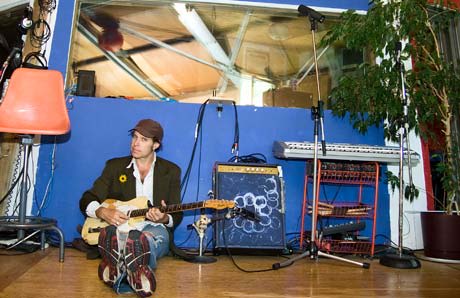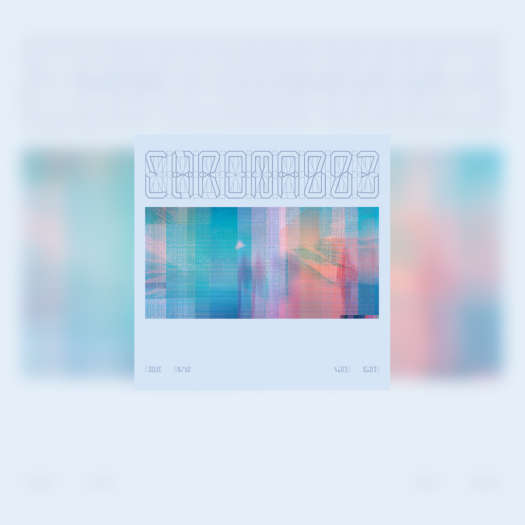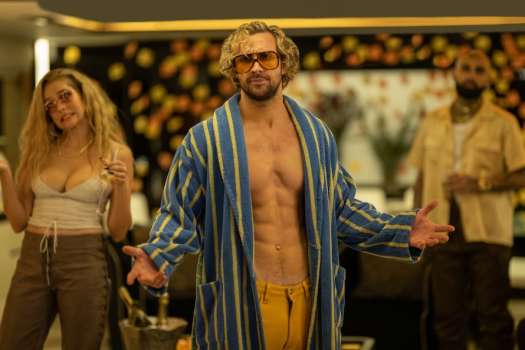When average nine-to-fivers imagine musicians going into the studio, it has all the romance of some grand adventure into the uncharted wilderness. In general, that glamorization isnt justified; most low to high-end recording studios located in suburbs and city centres are sterile, soundproofed isolation chambers, shutting creative people out from natural light and the outside world for hours so they can focus upon freezing their organic ideas for perpetuity. Sorry but its true.
Located on Toronto Island, the Gas Station is the perfect antidote for the mind-numbing recording blues. A short ferry ride from mainland Toronto, the analog and digital-ready studio is the pampered brainchild of liberated musician/engineer Dale Morningstar, whos worked with everyone from Gordon Downie to Godspeed You! Black Emperor. With his former business partner Don Kerr, Morningstar established the Gas Station 18 years ago, moving between downtown locations (once begrudgingly) before settling in two former school portables within the islands artistic hub at Gibraltar Point. Yards away from a Lake Ontario beach, the studios giant windows are virtually ventricles, sucking in revitalizing sunshine and providing a view of the flourishing remnants of an old forest and its wild inhabitants. And the live room sounds fucking awesome too. "The thing I get the most pleasure from has gotta be being in the canoe, Morningstar says, like a true islander. "Sometimes I wake up around five oclock in the morning to have a piss or something and Ill bolt upright and think, I gotta go out in the canoe. As soon as I get in that water, I never regret it. Its good for the soul. Things have definitely been mystical for the Gas Station (named for its wind-cutting operators), which was a mere gleam in Morningstars eye when he befriended Kerr in 1988. Fresh from the Niagara region, Morningstar snagged Kerr to play drums in his art-rock band, the Dinner is Ruined, but each also possessed fledgling sound engineering chops. In 1990, they sold their four-track machines, pooled their resources, and bought an all-in-one 8-track, quarter-inch reel-to-reel machine with built-in faders for $2,500. Quitting their respective delivery jobs, the pair spent the next year figuring out the contraption in a house on Liberty Street, where they recorded other musicians, charging $20/hour to make ends meet.
Each returned to part-time work but Morningstars ambitions to operate a real studio couldnt be denied. Before moving to their storied old warehouse space at 53 Fraser Avenue in 1992 to accommodate word-of-mouth customer demand, Morningstar had an epiphany. "I was delivering bread one day and decided that I wanted some recording equipment. I picked up a magazine, opened to the stuff-for-sale section, and right there was that board and that reel-to-reel, Morningstar recalls, pointing to the very same Gas Station equipment today. "I was like, Don! We gotta buy this stuff! He thought about it all weekend and wrote me a note, saying he didnt think we could make any money doing this and was gonna pass. Me, I was just furious and didnt talk to him for a week. I just said, Youre fucked and youre blowing this chance. I was just pouting and then one day Don just said, Okay, lets get it and we did. It couldve gone very differently. Before new landlords evicted them in 2000, the second Gas Station spawned incredible albums by artists like the Inbreds, Thrush Hermit, Godspeed, and finally Downie, who asked Morningstar to play guitar in his band. After organizing a well-publicized protest about the studios ouster, Morningstar checked out available space on Toronto Island, and was quickly smitten. "They gave me a key, I came in here, and I could hear the birds outside, Morningstar says. "After being at the other place, it was really depressing to think, Man, were gonna be in some bunker. I know that, after all these years of recording, if the studio had been in a place without windows, I would not be doing this now. Id be dead or burnt from it.
In 2005, Kerr left to concentrate on a home studio and, while two busy portables became one, Morningstar feels greater pride in his business and abilities, as a respected engineer. Rock Plaza Central has returned to follow-up their acclaimed work on 2006s Are We Not Horses, and Morningstars collaborative juices are flowing at full speed. "Whenever I get feeling like, Aw fuck, I dont wanna get behind the board again, all of a sudden Ill be lost in it, trying to dig out frequencies, pull sounds out, and I get in that zone. Then Ill go walk out on the beach early in the morning and feel like one of the luckiest musicians in Canada. I sincerely mean that; I love this studio.
Located on Toronto Island, the Gas Station is the perfect antidote for the mind-numbing recording blues. A short ferry ride from mainland Toronto, the analog and digital-ready studio is the pampered brainchild of liberated musician/engineer Dale Morningstar, whos worked with everyone from Gordon Downie to Godspeed You! Black Emperor. With his former business partner Don Kerr, Morningstar established the Gas Station 18 years ago, moving between downtown locations (once begrudgingly) before settling in two former school portables within the islands artistic hub at Gibraltar Point. Yards away from a Lake Ontario beach, the studios giant windows are virtually ventricles, sucking in revitalizing sunshine and providing a view of the flourishing remnants of an old forest and its wild inhabitants. And the live room sounds fucking awesome too. "The thing I get the most pleasure from has gotta be being in the canoe, Morningstar says, like a true islander. "Sometimes I wake up around five oclock in the morning to have a piss or something and Ill bolt upright and think, I gotta go out in the canoe. As soon as I get in that water, I never regret it. Its good for the soul. Things have definitely been mystical for the Gas Station (named for its wind-cutting operators), which was a mere gleam in Morningstars eye when he befriended Kerr in 1988. Fresh from the Niagara region, Morningstar snagged Kerr to play drums in his art-rock band, the Dinner is Ruined, but each also possessed fledgling sound engineering chops. In 1990, they sold their four-track machines, pooled their resources, and bought an all-in-one 8-track, quarter-inch reel-to-reel machine with built-in faders for $2,500. Quitting their respective delivery jobs, the pair spent the next year figuring out the contraption in a house on Liberty Street, where they recorded other musicians, charging $20/hour to make ends meet.
Each returned to part-time work but Morningstars ambitions to operate a real studio couldnt be denied. Before moving to their storied old warehouse space at 53 Fraser Avenue in 1992 to accommodate word-of-mouth customer demand, Morningstar had an epiphany. "I was delivering bread one day and decided that I wanted some recording equipment. I picked up a magazine, opened to the stuff-for-sale section, and right there was that board and that reel-to-reel, Morningstar recalls, pointing to the very same Gas Station equipment today. "I was like, Don! We gotta buy this stuff! He thought about it all weekend and wrote me a note, saying he didnt think we could make any money doing this and was gonna pass. Me, I was just furious and didnt talk to him for a week. I just said, Youre fucked and youre blowing this chance. I was just pouting and then one day Don just said, Okay, lets get it and we did. It couldve gone very differently. Before new landlords evicted them in 2000, the second Gas Station spawned incredible albums by artists like the Inbreds, Thrush Hermit, Godspeed, and finally Downie, who asked Morningstar to play guitar in his band. After organizing a well-publicized protest about the studios ouster, Morningstar checked out available space on Toronto Island, and was quickly smitten. "They gave me a key, I came in here, and I could hear the birds outside, Morningstar says. "After being at the other place, it was really depressing to think, Man, were gonna be in some bunker. I know that, after all these years of recording, if the studio had been in a place without windows, I would not be doing this now. Id be dead or burnt from it.
In 2005, Kerr left to concentrate on a home studio and, while two busy portables became one, Morningstar feels greater pride in his business and abilities, as a respected engineer. Rock Plaza Central has returned to follow-up their acclaimed work on 2006s Are We Not Horses, and Morningstars collaborative juices are flowing at full speed. "Whenever I get feeling like, Aw fuck, I dont wanna get behind the board again, all of a sudden Ill be lost in it, trying to dig out frequencies, pull sounds out, and I get in that zone. Then Ill go walk out on the beach early in the morning and feel like one of the luckiest musicians in Canada. I sincerely mean that; I love this studio.




